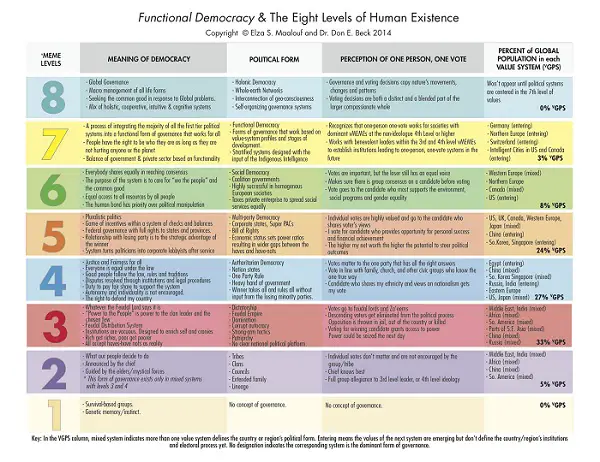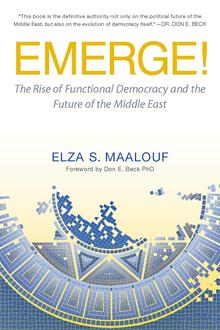|
TRANSLATE THIS ARTICLE
Integral World: Exploring Theories of Everything
An independent forum for a critical discussion of the integral philosophy of Ken Wilber
 ELZA S. MAALOUF is a Lebanese-American futurist, theorist, author and public speaker. She is one of the foremost experts on the memetics of the Middle East who pioneered the use of the Value Systems framework and Integral Theory in Middle Eastern politics and business. She is the author of Emerge!: The Rise of Functional Democracy and the Future of the Middle East.
ELZA S. MAALOUF is a Lebanese-American futurist, theorist, author and public speaker. She is one of the foremost experts on the memetics of the Middle East who pioneered the use of the Value Systems framework and Integral Theory in Middle Eastern politics and business. She is the author of Emerge!: The Rise of Functional Democracy and the Future of the Middle East.
Evolutionary Democracy and The Future of the Middle EastElza S. MaaloufIntroduction
The Middle East is going through the same rites of passage that the West went through, until our collective consciousness was raised to believe in the power of institutions not war.
When the Athenian philosophers introduced the concept of democracy over 2500 years ago, no one could have predicted it will become the dominant model by which the world is governed today. While the “rule of the people” has served some cultures well, it has also been distorted and manipulated by many rulers and elected officials. Historically, the Ottomans are known to have created some of the very first models for effective governance yet today, the majority of their former territories seem to be ruled by brutal men. The United States is thought of as the best functioning modern-day democracy, yet it's political process seems to have supplanted the rule of the people in favor of the rule of corporations. While the social democracies of Western Europe claim to have the most representative model, their failure to integrate their large migrant population is a clear sign that something is amiss. Would the approach to the issue of governance back then be different knowing how human intelligence and cultural complexity has evolved over the last 25 centuries? Would “the rule of the people” still be the central theme of democracy after witnessing the political and economic paralysis that has gripped the West in recent years and after seeing the results of the one-person, one-vote system that descended Iraq into a civil war, brought to power the brutal regimes of the Muslim Brotherhood in Egypt and Hamas in Gaza? An Evolutionary Approach to GovernanceSince democracy was introduced in Greek city-states the human journey has come a long way. Research shows that human and cultures evolve to higher levels of existence along their journey. In some cases certain societies add more complexity while others become averse to progress. This suggests that modes of governance should be designed to fit the needs of the culture, and a more stratified approach might lead to more effective governing structures. While many of our human values and business practices have evolved, we continue to use a simple linear model for governance in a world that has become extraordinarily complex. In order to govern effectively there has to be a shift in thinking that places democracy on an evolutionary track that takes into account the different levels of human and cultural development. This is what I call in my book Emerge! the Functional Democracy model. In addition to some social psychology and conflict resolutions concepts that I developed in my fieldwork in the Middle East, I use the value systems model that was developed by Dr. Clare Graves and my associate Dr. Don E. Beck to bring clarity to evolutionary governance. The combined framework proposes that each culture has the potential to evolve into eight known levels of human existence, producing six distinct structures for governance. Each level transcends and includes the previous system and becomes more resilient in order to answer to higher levels of consciousness among the voters. Here are the six systems that define the Functional Democracy Model:
Making Sense of Middle Eastern ChaosIn order to put political dysfunction in the Middle East in perspective, I frame the issues through concepts I developed in my fieldwork in combination with the Value Systems framework and Functional Democracy framework. This provides an eye-opening account of how different cultures require different governing systems. Our work identifies areas where the development of the culture is arrested. We then work with local observers who know the political and cultural history and have insider information on the causes that prevent progress from taking place. We call these people the Indigenous Intelligence Experts (IIEs). In my decade long work with Dr. Beck on a project called the Build Palestine Initiative, it was these experts who came together in a Nation Building Summit to outline the development challenges of their future state, which later became the blueprint for Prime Minister Fayyad in preparation for Palestinian statehood. In short, it is the Indigenous Intelligence that made all that possible. Our involvement, along with the science behind the Value Systems framework has shown that the Middle East is transitioning through the toughest phase of the human experience. It is the upshift from a place where power lies in the Individual clan leader (Al-Za'eem) to a place where power is vested in the Institution. While the influence of Al Qaeda has been marginalized, ISIL, a far deadlier and more organized group has appeared. Syria continues to disintegrate and refugees keep overwhelming the neighboring countries. As sad as this reality is, the Middle East is going through the same rites of passage that the West went through, until our collective consciousness was raised to believe in the power of institutions not war. For the next century the Middle East will be defined by its emergence into the nation-states stage of cultural development. The transition into this phase will be further complicated by several factors that I detail in the book:
Although the task ahead is formidable the West still has a critical role to play. A passive policy towards the region will embolden Russia, China and Iran to further destabilize the region and arrest its emergence to higher values. Under this framework, engagement with the region has to evolve as well and show a different manifestation of power. There has to be a paradigm shift from military intervention to building the region's human capacities. This is the next frontier that will shape global politics for decades to come. Whether this can still be considered an evolution of the original model of democracy remains unknown. One thing is clear: the future of geopolitics requires far deeper understanding of the values that motivate cultures and the different governance models needed to put each country on a sustainable pathway.  Click here to enlarge |

